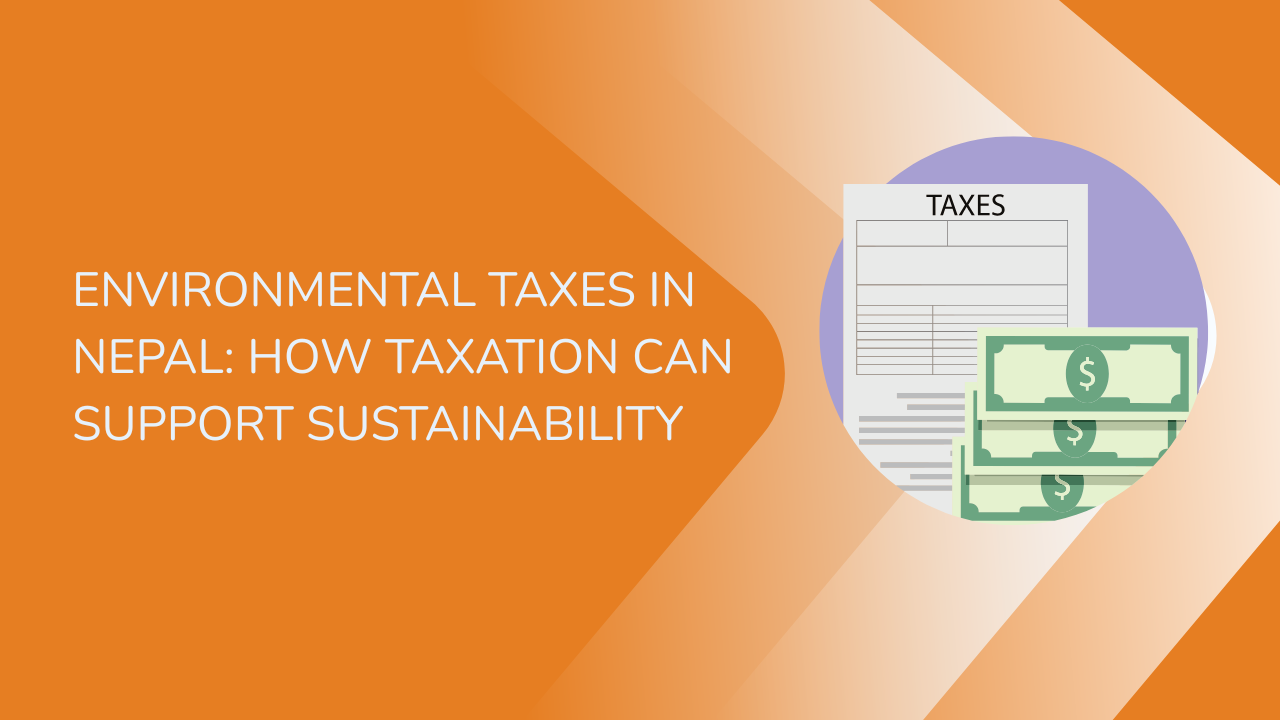Share this Article
Taxes are the foundation of any thriving economy. In Nepal, tax revenue is pivotal for sustaining the country’s growth and for funding key public services such as healthcare, education, infrastructure, and social welfare. Taxes also play a crucial role in fostering economic stability, promoting social equity, and generating the resources needed to propel the nation towards its development goals. In this article, we will delve deeper into the significance of taxes in Nepal, explaining how they contribute to the nation’s economic development and why understanding the tax system is essential for every citizen.
The Importance of Taxes in Economic Development
Taxes are the primary means by which the government collects funds to invest in the development of the country. For a nation like Nepal, with a developing economy, taxes are particularly important in ensuring that essential services are available to the population and that the government has the necessary resources to meet its economic goals. Below, we explore why taxes are vital to the country’s growth and development.
- Revenue for Public Services: Taxes provide the revenue necessary to fund a wide range of public services, from healthcare to education. These services are essential for improving the quality of life of the population. Without a reliable tax system, the government would not have the financial resources to provide these services, which are the backbone of any nation’s progress.
- Building National Infrastructure: Infrastructure is key to the economic development of any country. Taxes are used by the government to build roads, bridges, airports, schools, and hospitals. These infrastructures enable smoother trade, enhance connectivity, and make it easier for businesses to operate efficiently. This, in turn, leads to economic growth by facilitating commerce and improving the living standards of citizens.
- Social Welfare Programs: Tax revenue also supports social welfare programs aimed at alleviating poverty and helping vulnerable populations. These include subsidies, financial aid for the elderly and disabled, and other social safety nets. Tax-funded welfare programs play a vital role in reducing inequality and ensuring that no citizen is left behind in the development process.
- Managing Public Debt: Taxes are crucial for managing the country’s public debt. The government often borrows money to finance large infrastructure projects and other development initiatives. However, without a steady flow of tax revenue, repaying these loans becomes difficult. A well-functioning tax system ensures that the government can meet its debt obligations and maintain a balanced fiscal position.
- Economic Stabilization and Policy Implementation: Taxes are an effective tool for economic stabilization. The government can adjust tax rates to control inflation, stimulate economic activity, or curb excess spending. By tweaking the tax system, the government can influence the level of aggregate demand and ensure the economy remains stable and balanced.
Types of Taxes in Nepal
Nepal’s tax system comprises various taxes levied at different levels of government. These taxes are broadly categorized into two types: direct taxes and indirect taxes. Each type of tax has a unique purpose, and together, they generate the necessary revenue for the government. Below is a detailed look at both types of taxes in Nepal.
1. Direct Taxes
Direct taxes are imposed directly on individuals and businesses, based on their income or wealth. These taxes are not passed on to other parties but are paid by the taxpayer directly to the government. In Nepal, the most significant direct taxes include:
- Income Tax: Income tax is one of the primary sources of revenue in Nepal. This tax is levied on individuals and businesses based on their earnings. The tax rates vary depending on the level of income. For individuals, the rates range from 1% to 36%, with higher earners paying a larger percentage. Businesses in Nepal are generally taxed at a rate of around 25%, though certain exemptions and deductions may apply.
- Property Tax: Property tax is levied on the value of real estate owned by individuals or entities. Local governments impose this tax to generate revenue for funding community development and maintaining local services. Property taxes are crucial for financing municipal infrastructure, such as water supply, sanitation, and local roads.
- Wealth Tax: Although it is not commonly enforced, wealth tax exists in Nepal and is meant to target individuals with considerable assets. Wealth tax is typically charged on a person’s net worth, including their assets like land, buildings, and financial holdings. However, due to enforcement challenges, this tax is not a significant revenue source.
2. Indirect Taxes
Indirect taxes are taxes on goods and services rather than income or wealth. These taxes are collected by businesses on behalf of the government, and they are typically passed on to consumers as part of the price of goods or services. In Nepal, the major forms of indirect taxes include:
- Value Added Tax (VAT): VAT is the most significant indirect tax in Nepal. It is levied on goods and services at each stage of production and distribution. The standard VAT rate in Nepal is set at 13%, and businesses charge this rate on their sales. However, businesses can offset the VAT they pay on their purchases against the VAT they collect from their sales. This makes VAT a consumption tax that is paid by consumers but collected by businesses.
- Excise Tax: Excise taxes are specific taxes imposed on goods that are seen as non-essential or potentially harmful, such as alcohol, tobacco, and luxury items. These taxes are often higher than VAT and are intended to reduce consumption of harmful products while generating additional revenue for the government.
- Customs Duties: Customs duties are taxes levied on goods imported into Nepal. They serve two purposes: protecting local industries from foreign competition and generating revenue from international trade. These duties are generally levied as a percentage of the value of imported goods and are calculated based on the classification of products under Nepal’s customs regulations.
- Sales Tax: Sales tax, which existed before VAT, is still applicable to certain goods in Nepal. This tax is typically applied at the retail level and varies depending on the type of product. However, most goods are now taxed under the VAT system, and sales tax is applied only to specific categories.
- Service Tax: In addition to taxes on goods, certain services in Nepal are also subject to taxation. The service tax is applied to services such as telecommunications, restaurant meals, and transportation. Service tax rates are typically lower than VAT, but they still represent an important source of revenue for the government.
How Tax Revenue is Utilized in Nepal’s Development
The revenue generated from taxes is crucial for funding various sectors of the economy, which ultimately contributes to the development of the country. Here is how tax revenue is allocated across different sectors in Nepal:
- Infrastructure Development: A significant portion of tax revenue is used to build and maintain infrastructure. Roads, highways, airports, and bridges are all financed through tax revenue. These infrastructure projects are vital for improving transportation, facilitating trade, and enhancing connectivity across the country. A robust infrastructure network is essential for the economic development of Nepal as it helps businesses operate more efficiently and enhances the overall quality of life for citizens.
- Education and Healthcare: Tax revenue is also directed towards improving public education and healthcare services. Hospitals, schools, and universities are funded using taxes, providing crucial services to the population. By investing in education and healthcare, the government helps improve human capital, leading to a healthier and more skilled workforce.
- Social Welfare Programs: Another critical area funded by taxes is social welfare. The government uses tax revenue to provide support for the elderly, the disabled, and low-income families. This includes programs such as subsidies for essential goods, financial assistance for the poor, and other social safety nets. These programs help reduce poverty and ensure a more equitable distribution of resources.
- Public Administration and Governance: Taxes also finance the operations of government institutions, law enforcement agencies, and the judiciary. A well-functioning government requires a stable and efficient public administration, which is funded by taxes. This ensures the smooth functioning of the country’s legal and regulatory systems, maintaining peace and order.
- Debt Management: Nepal, like many developing nations, has borrowed funds to finance major projects and stimulate economic growth. Taxes help the government meet its debt obligations by providing the necessary revenue for repayment. Managing public debt efficiently is essential for maintaining economic stability and avoiding the risk of a debt crisis.
Taxes and Economic Growth
The tax system not only generates revenue for the government but also influences the broader economy. Well-structured taxes can encourage investment, stimulate growth, and foster a fairer distribution of wealth. Here are some ways taxes impact Nepal's economic development:
- Investment Incentives: By offering tax incentives and exemptions to businesses, the government can encourage investment in critical sectors. For example, tax breaks for businesses investing in manufacturing or infrastructure can promote industrialization, create jobs, and drive economic growth. Lower tax rates on foreign investment can also attract international capital, boosting the economy.
- Reducing Inequality: Progressive taxes, such as income taxes that tax higher earners at higher rates, help reduce income inequality. The government can use the revenue generated from higher-income groups to fund social programs and provide financial support to lower-income citizens. This redistribution of wealth ensures that the benefits of economic growth are shared more equally across society.
- Promoting Savings and Consumption: Tax policies can also incentivize saving and consumption. For instance, tax deductions for savings can encourage citizens to save more, thereby promoting capital formation. At the same time, reducing taxes on consumption can increase purchasing power, driving demand for goods and services.
- Fiscal Stability: Taxes provide the government with the means to stabilize the economy. By adjusting tax rates and implementing fiscal policies, the government can manage inflation, control demand, and support economic growth during recessions. Taxation is a key tool in managing macroeconomic stability, ensuring that the economy does not overheat or stagnate.
The Role of Citizens in the Tax System
Every citizen has a role to play in the country’s tax system. Understanding taxes and fulfilling tax obligations is essential for the overall well-being and progress of the nation. Here’s why tax awareness is critical for citizens:
- Accountability and Transparency: Citizens should be aware of how tax revenue is being spent. By staying informed about the allocation of tax funds, citizens can hold the government accountable and ensure that taxes are used effectively for public services and infrastructure.
- Encouraging Compliance: When citizens understand the importance of taxes in supporting public services and development, they are more likely to pay taxes on time and comply with tax regulations. Awareness helps in reducing tax evasion and encourages people to contribute to the nation’s growth.
- Active Civic Participation: Tax knowledge fosters better civic engagement. Citizens who understand the role of taxes in the economy are more likely to participate in public discussions and contribute to decisions regarding tax policies and government spending.
- Promoting Fairness in the Tax System: A well-informed population ensures that everyone pays their fair share of taxes. Awareness about tax policies and the tax code ensures that citizens understand the need for equitable taxation and are more supportive of a fair and just system.
Conclusion
Taxes are the lifeblood of Nepal’s economy, ensuring that the government has the resources to provide essential services, build infrastructure, and promote social equity. By understanding the role of taxes in economic development, citizens can contribute to a more transparent, accountable, and efficient tax system. Taxes not only help in funding public services but also promote investment, reduce inequality, and stabilize the economy. For Nepal to achieve sustainable development and improved living standards, it is essential that both the government and citizens work together to ensure a robust and fair tax system that benefits all.
Categories:
Tax Information
Tags:
Online Store in Nepal
,
5 Simple Steps
,
local businesses
,
e-commerce app
,
Small Business
,
strong brand
,
E-commerce
,
Role of Social Media
,
Growing sales
,
strategies
,
Social media
,
Logistics
,
Delivery Networks
,
Flexible Delivery
,
Mobile Platforms
,
Web
,
SEO
,
search engine optimization
,
Global E-commerce
,
Nepali businesses
,
reviews and ratings
,
Dropshipping
,
picture
,
Photography
,
Fraud prevention
,
E-commerce fraud
,
Influencer marketing
,
Boost
,
festival season
,
Top Mistakes
,
key trends
,
e-commerce landscape.
,
Building trust
,
Nepali e-commerce market
,
Starting an online store
,
launch
,
Email Marketing
,
Email List
,
Handling returns and refunds
,
Cash on Delivery vs. Online Pa
,
(COD) vs Online Payment
,
Cash on Delivery
,
Pricing
,
cost of goods sold (COGS)
,
DigitalNepal
,
NepaliEntrepreneurs
,
GrowOnlineNepal
,
RetailRevolution
,
ShopOnlineNepal
,
FutureOfRetail
,
NepalEcommerce
,
NepalTaxTips
,
EcommerceNepal
,
BusinessTaxesNepal
,
DigitalBusinessNepal
,
SellSmartNepal
,
ProductDescriptionTips
,
BoostSalesNepal
,
OnlineSellingNepal
,
DataProtectionNepal
,
PrivacyMatters
,
SecureEcommerce
,
ContentMarketingNepal
,
BloggingForBusiness
,
ContentMarketing
,
BloggingNepal
,
MarketingThroughBlogs
,
BloggingTipsForBeginners
,
ProductPhotography
,
EcommercePhotography
,
CreativeProductPhotos
,
Quality Product
,
ClientRetention
,
NepaliShoppers
,
CustomerConnection
,
RelationshipMarketing
,
NepaliProducts
,
NepalSale
,
NepaliDiscounts
,
NepalAIRevolution
,
TechInNepal
,
AIForBusinessNepal
,
AIforCustomerServiceNepal
,
NepalBusiness
,
StartupNepal
,
Ecommerce2025
,
ChooseRightPlatform
,
UXDesignNepal
,
ImproveUX
,
UXTips2025
,
WebsiteDesignNepal
,
erce Ecosystem":
,
CustomerRetention
,
SubscriptionModel
,
ScaleYourBusiness
,
PluginsForEcommerce
,
EcommerceTrends2025
,
BusinessGrowthNepal
,
Gamification
,
GamifyYourBusiness
,
GamificationMarketing
,
BoostEngagement
,
Blockchain
,
DigitalTransformation
,
FutureOfCommerce
,
BlockchainTechnology
,
B2BEcommerce
,
NepalEconomy
,
B2BMarket
,
TechForGrowth
,
SMEsNepal
,
VideoMarketing
,
OnlineSales
,
GrowYourStore
,
VideoForEcommerce
,
MarketingTips
,
ContentCreation
,
DigitalHospitality
,
TourismInnovation
,
TravelEcommerce
,
TourismTrends
,
OnlineGroceryNepal
,
GroceryDelivery
,
NepalStartups
,
SmartShopping
,
SubscriptionServices
,
SmartCommerce
,
RecurringRevenue
,
EcommerceGrowth
,
SustainableEcommerce
,
GreenBusinessNepal
,
EcoConsciousNepal
,
GreenLogisticsNepal
,
PostPandemicBusiness
,
OnlineShoppingNepal
,
PandemicDrivenChange
,
DigitalShiftNepal
,
BusinessTransformation
,
OnlineBusinessNepal
,
RegisterYourBusiness
,
EntrepreneurNepal
,
BusinessRegistrationNepal
,
LegalChecklist
,
BusinessRegistration
,
NepalEntrepreneurs
,
StartupLegalNepal
,
LaunchYourStore
,
BuildYourBusiness
,
StartupStrategy
,
EntrepreneursNepal
,
NepalBusinessIdeas
,
ScalableBusinessModel
,
OnlineStore
,
EcommerceTips
,
BusinessNepal
,
DropshippingNepal
,
WholesaleNepal
,
Domainnametips
,
choosetherightdomain
,
Onlinestorenepal
,
Domainstrategy
,
Smartdomainchoice
,
Nocodenepal
,
Onlinestoresetup
,
Startsellingonline
,
Digitalstorenepal
,
Startuptipsnepal
,
SEOfornepal
,
Ecommercemarketing
,
Growyourbusiness
,
Leadgenerationnepal
,
Brandbuildingnepal
,
FacebookAdsNepal
,
Digitalmarketingnepal
,
Instagrapadsnepal
,
Socialmediamarketing
,
Onlinemarketingtips
,
Metaadsnepal
,
Digitalpayment
,
Nocashnoproblem
,
Nepaldigitalcheckout
,
Ecomeasenepal
,
Paysmartnepal
,
DigitalNepalBusiness
,
SupportNepaliStore
,
SmartAdStrategy
,
CreativeAdsDaily
,
TargetedReach
,
GrowthViaAds
,
DigitalGrowthTactics
,
WhatsappMarketingNepal
,
ChatCommerceNepal
,
WhatsappBusinessNepal
,
SellOnWhatsapp
,
NepalEcommerceTips
,
Shopmartonline
,
OnlineShopLife
,
ContentToCheckout
,
DigitalMarketVibes
,
ProductInMotion
,
SmartSellingNepal
,
StartupBudgeting
,
BudgetTipsNepal
,
BudgetBasics
,
MoneyMindsetNepal
,
NepalCourierTips
,
SmartDeliveryNepal
,
FastDeliveryNepal
,
NepalEcomDelivery
,
LogisticsForStartups
,
PricingMindset
,
BuyerPsychology
,
PriceTactics
,
PsychSmartSelling
,
SalesThroughPsychology
,
ReturnWithRespect
,
CustomerTrustFirst
,
RefundDoneRight
,
PostPurchaseCare
,
NoHassleNepal
,
LocalLogisticsNepal
,
SmartWarehousing
,
NepalEcommerceGrowth
,
NepalOnlineRetail
,
WarehousingWins
,
SmartStockFlow
,
InventoryClarity
,
SupplySyncNepal
,
DigitalStockGuard
,
RestockSMart
,
EcomSubscriptionTrend
,
EcomUnboxingExperience
,
NepalEcomEvolution
,
EcommerceDeliveryFlow
,
AutomatedCommerce
,
CyberSafeCommerce
,
EcomSecurityShield
,
NoBreachZone
,
SecureCartJourney
,
HackProofHustle
,
EncryptToProtect
,
SecureStorefront
,
EcomDefense
,
LoginShield
,
2FASaves
,
ClickSecurely
,
FraudAwareNepal
,
SecureEcomFlow
,
TrustYourCheckout
,
ReturnsUnderControl
,
VerifyBeforeShip
,
PrivacyForNepal
,
DataRightMatters
,
DigitalTrustNepal
,
NepalCyberAware
,
GuardYourData
,
SalesTriggerNepal
,
FastTrackSelling
,
NepalEcomHacks
,
RapidRetailMoves
,
QuickDealDynamics
,
NepaliFestiveDeals
,
ShopNepalOnline
,
DashainTiharOffers
,
NepalEcommerceFest
,
YearEndSaleNepal
,
NepalClearanceDeals
,
NepaliEcommerceSale
,
NepalYearEndClearance
,
NepalWholesaleDeals
,
BulkBuyNepal
,
NepaliBusinessOffers
,
NepalBusinessGrowth
,
WholesalePricing
,
PricingStrategy
,
ProfitMaximization
,
SMBNepal
,
CostingAndPricing
,
CustomerInsights
,
CustomerExperience
,
KnowYourCustomer
,
CustomerFirst
,
DataDrivenMarketing
,
CustomerLoyalty
,
LoyaltyStrategy
,
RetentionMarketing
,
MadeInNepal
,
ColorPsychology
,
BrandColors
,
ColorMatters
,
DesignPsychology
,
UserExperience
,
SameDayDelivery
,
LogisticsSolutions
,
LastMileDelivery
,
FastShipping
,
CustomerSupport
,
EcommerceRetention
,
RetentionStrategy
,
CustomerSatisfaction
,
ThriftNepal
,
SecondhandFashion
,
SustainableStyle
,
ThriftCulture
,
OrganicNepal
,
EcoNepal
,
OrganicProductsNepal
,
GreenEntrepreneurship
,
LuxuryEcommerceNepal
,
NepalLuxuryMarket
,
DigitalLuxury
,
LuxuryRetailNepal
,
DigitalTransformationNepal
,
EcommerceTrends
,
NepalRetailShift
,
OnlineShoppingTrends
,
EcommerceInsights
,
KathmanduOnline
,
RuralConnectivity
,
UrbanRuralBridge
,
NepaliConsumers
,
CustomerExpectations
,
ConsumerBehavior
,
OnlineRetailNepal
,
NepalLogistics
,
WarehousingNepal
,
NepalLogistic
,
MultiChannelSelling
,
OmnichannelNepal
,
MarketplaceStrategy
,
NepaliSellers
,
SocialCommerceNepal
,
NepalDropshippers
,
RemoteSellingNepal
,
SupplyChainSimplified
,
DropshipSmartNepal
,
FromNepalToGlobal
,
EcommerceLawsNepal
,
NepalEcommerceGuide
,
OnlineBusinessRegulations
,
DigitalNepalCompliance
,
NepalLegalGuide
,
LocalizedMarketingNepal
,
NepaliDigitalMarketing
,
MarketToNepal
,
SellOnlineNepal
,
WinningMindset
,
StartupSuccess
,
NepalDigitalMarketing
,
NepalEcommerce2025
,
ClientEngagement
,
EcommerceGrowthNepal
,
EffectiveBranding
,
NepalInfluencerMarketing
,
Rank1Nepal
,
NepalEcommerceSEO
,
SellMoreOnline
,
PricingStrategies
,
OnlineStoreSuccess
,
SEOProductDescriptions
,
ConversionCopywriting
,
NepalBusinessTips
,
ProfitableStartups
,
PassiveIncomeStreams
,
NepalOnlineStoreSuccess
,
NepalEcommerceInsights
,
EcommerceKPIsNepal
,
EcommerceUXNepal
,
NepalEcommerceMetrics
,
DataDrivenNepal
,
CustomerJourneyMapping
,
ChatbotCX
,
LeadManagement
,
CRM
,
GlobalEcommerce
,
EcommerceInNepal
,
DigitalAccountingNepal
,
NepalEcommerceInfluencers
,
NepalSocialMediaStrategy
,
EmailCampaignNepal
,
PersonalizedEmailsNP
,
SmallBusinessSuccess
,
DTCRevolution
,
OnlineStoreTips
,
MobileCommerceNepal
,
BrandingVsMargins
,
SustainableShopping
,
EcoFriendlyProducts
,
NepalNFTMarket
,
NepalEcommerceRevolution
,
NepalDigitalEntrepreneurs
,
MarketingMastery
,
NepalEcommerceElite
,
PrintOnDemandNepal
,
NepalEcomAds
,
NepalAdOptimization
,
NepalDigitalRewards
,
ExclusivityInTheDigitalAge
,
SocialSellingNepal
,
WhiteLabelNepal
,
CompetingWithGiants
,
SmallBizGrowth
,
PsychPricingHacks
,
AIEnhancedCheckout
,
StartupPitfallsNepal
,
HeadlessCommerce
,
LeadGeneration
,
webdesign
,
CrossBorderEcommerce
,
GlobalPricing
,
EthicalRetail
,
CustomsDuties
,
GlobalTradeCompliance
,
ShopSmall
,
Squarespace
,
ProfitMargins
,
SalesStrategy
,
CrossSelling
,
CashFlowManagement
,
DataPrivacy
,
LegalCompliance
,
ChargebackPrevention
,
ChargebackManagement
,
ProtectYourBrand
,
TaxTipsNepal
,
TaxationNepal
,
tag Name
,
admin saauzi
,
E-commerce
,
Tags Name







